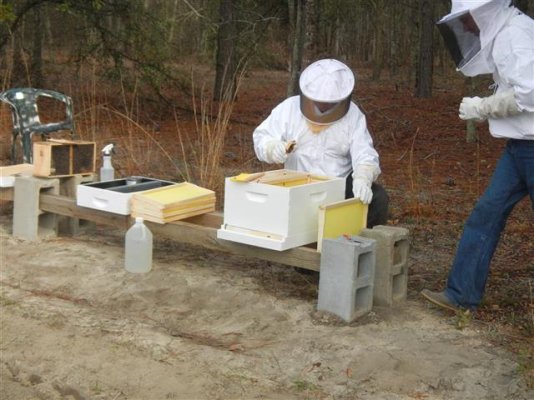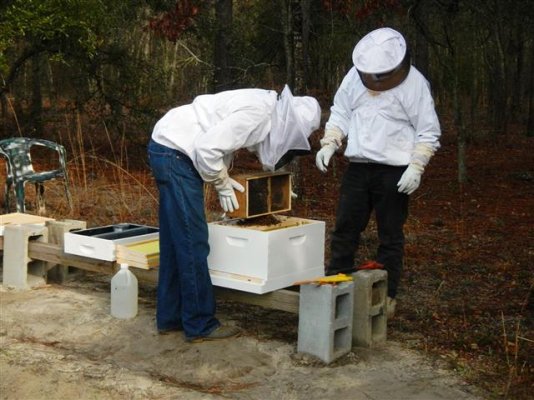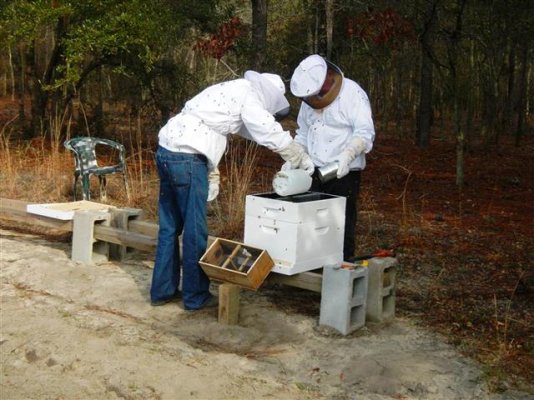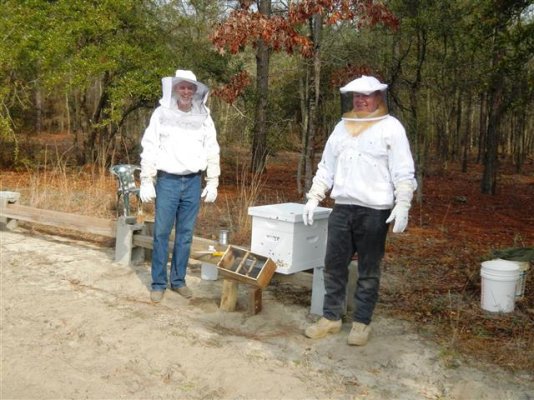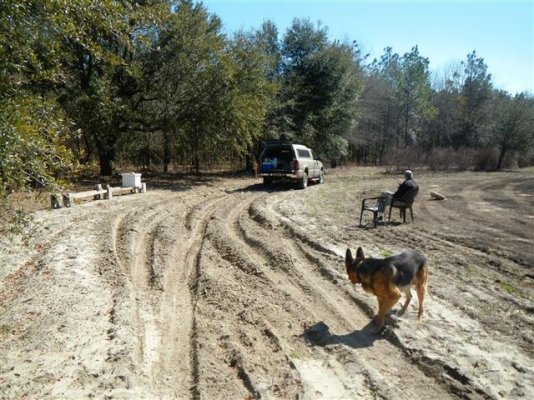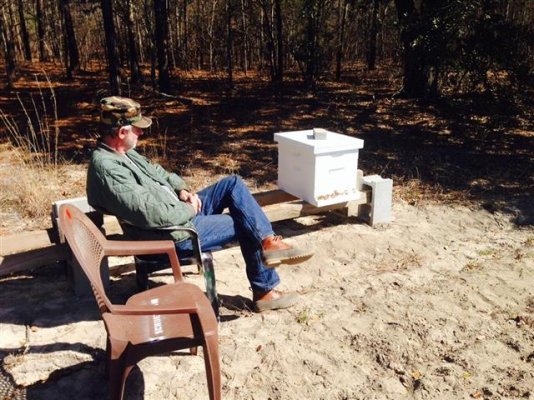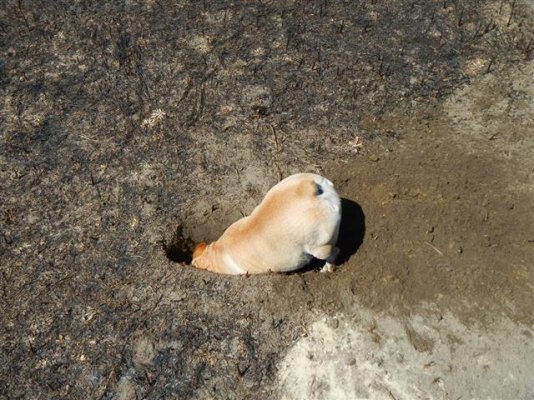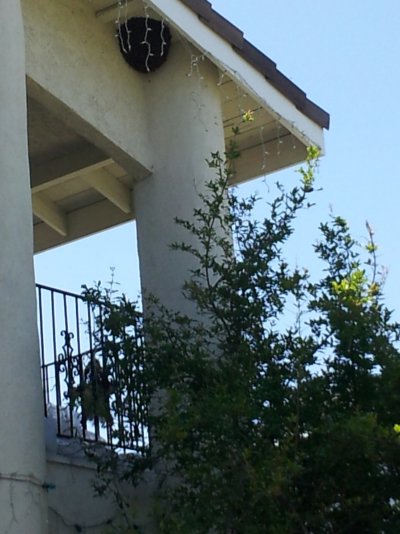You are using an out of date browser. It may not display this or other websites correctly.
You should upgrade or use an alternative browser.
You should upgrade or use an alternative browser.
Beekeeping...
- Thread starter Redbugdave
- Start date
Redbugdave
Thinks s/he gets paid by the post
jjquantz
Full time employment: Posting here.
So cool!
chris66
Recycles dryer sheets
- Joined
- Jan 21, 2014
- Messages
- 78
Nice! Yes, DH is planning on beekeeping. Because we'll be knee deep in home remodeling and getting the yard in better shape for months to come, we won't be starting this year. I expect he will get them next year, though. I'm showing him this thread, and we'll be following closely and learning all we can.
Redbugdave
Thinks s/he gets paid by the post
Chris...Plan ahead and get your beekeeping stuff in the winter. I suggest that beginner's kit from Dadant, that I linked to. It has all you need to get started, except the bees. Then, join your local bee club. You will meet the other beekeepers and people just like you. These bee clubs offer classes and advise. I bought my bees through my local bee club at a reduced price as compared to ordering them from bee catalogs. You will need to place your orders early...like the January time frame. Everything is set in place for the year by what you do and order in the late winter or early spring. Bees need time to make their colonies and grow. Starting late does not let the colony expand enough before the next winter comes. First year, not much honey for you. Second year, I think you will have a good plan and adding more hives as well as dividing strong hives to make two hives. And away you go! Ain't life Great!
Last edited:
chris66
Recycles dryer sheets
- Joined
- Jan 21, 2014
- Messages
- 78
Thanks for the info, Red (or maybe Dave)! I just went through this whole thread with DH. Thanks for the helpful information. Keep the pics coming. Hopefully, we'll post some pics of our own next year. We may have lots of questions then, too.
BTW - beautiful helper, there. I had a GSD when I was 5. I'm a big fan of Shepards. My current helpers are a 13 yo Belgian Sheepdog (similar to GSD), and a recently picked up adolescent Lab.
BTW - beautiful helper, there. I had a GSD when I was 5. I'm a big fan of Shepards. My current helpers are a 13 yo Belgian Sheepdog (similar to GSD), and a recently picked up adolescent Lab.
Redbugdave
Thinks s/he gets paid by the post
Yup...I'm just Dave.
Around three days after installing the bees, you need to check them to see if the queen has been released from the little cage she was in. The bees eat a little candy plug away to release her. She needs to be in a cage so she won't get lost in the shuffle and the bees have time to accept her. All the bees come from various other hives and thrown in together with a queen from somewhere else to make up the package. And they all accept each other since it's either that or die.
So on Wednesday a good friend and I, (with our puppies), went to check on them. And it was a beautiful day to get out, anyways. It was cool and so I worked fast...just enough to check, get the queen cage out, add more sugar water, and close them up again. The bees had released the queen! The bees were in a cluster and I hated to disturb them but I needed to know. I discovered that bees do not like shepherds. I had to move the truck away and put Pal in it. They just ignored Tippy, I think because she is smaller and light colored. I also think Eddie is raising burrowing mice at his farm, (besides his pet wild rattlesnakes), over there...since Tippy spent all her time snooping them out...Eddie had burned his field a couple weeks earlier to control the sandspurs and I guess the mouse holes were more inviting to Tippy. And shepherds are the best!
Around three days after installing the bees, you need to check them to see if the queen has been released from the little cage she was in. The bees eat a little candy plug away to release her. She needs to be in a cage so she won't get lost in the shuffle and the bees have time to accept her. All the bees come from various other hives and thrown in together with a queen from somewhere else to make up the package. And they all accept each other since it's either that or die.
So on Wednesday a good friend and I, (with our puppies), went to check on them. And it was a beautiful day to get out, anyways. It was cool and so I worked fast...just enough to check, get the queen cage out, add more sugar water, and close them up again. The bees had released the queen! The bees were in a cluster and I hated to disturb them but I needed to know. I discovered that bees do not like shepherds. I had to move the truck away and put Pal in it. They just ignored Tippy, I think because she is smaller and light colored. I also think Eddie is raising burrowing mice at his farm, (besides his pet wild rattlesnakes), over there...since Tippy spent all her time snooping them out...Eddie had burned his field a couple weeks earlier to control the sandspurs and I guess the mouse holes were more inviting to Tippy. And shepherds are the best!
Attachments
Last edited:
Redbugdave
Thinks s/he gets paid by the post
And I just had to add this thread from one of the beekeeping forums I frequent...
Ain't kids great? She has some real talent!
What happens when you ask your 11 year old daughter to "paint" hive bodies
Ain't kids great? She has some real talent!
What happens when you ask your 11 year old daughter to "paint" hive bodies
chris66
Recycles dryer sheets
- Joined
- Jan 21, 2014
- Messages
- 78
Love the artwork! Looks like she had a great time. Makes me think I'll have my young nieces help paint ours when we're ready.And I just had to add this thread from one of the beekeeping forums I frequent...
Ain't kids great? She has some real talent!
What happens when you ask your 11 year old daughter to "paint" hive bodies
Had to join the forum to see the pictures, but since we plan to get bees, seemed a reasonable thing to do.
Redbugdave
Thinks s/he gets paid by the post
Chris and the others...I did not realize that you had to join to see the pictures. Well, if you are interested in bees anyways it's worth joining and learning just like these forums.
CyclingInvestor
Thinks s/he gets paid by the post
Last week my friend realized she was growing a few hives each as big as a persons head in her hot water heater enclave. A beekeeping community was contacted and they sent out a guy with a "bee vacuum" who safely removed them.
A couple years ago another nearby house had to have one removed.
A couple years ago another nearby house had to have one removed.
Attachments
Redbugdave
Thinks s/he gets paid by the post
Hi Charles...This should give you some leads for up around your way. Something I did not know...North Dakota is the #1 honey producing state in the nation!
North Dakota Beekeepers Association | North Dakota Department of Agriculture
Apiary Program (Honey Bees) | North Dakota Department of Agriculture
North Dakota Beekeepers Association | North Dakota Department of Agriculture
Apiary Program (Honey Bees) | North Dakota Department of Agriculture
brewer12345
Give me a museum and I'll fill it. (Picasso) Give me a forum ...
- Joined
- Mar 6, 2003
- Messages
- 18,085
I have been taking a couple classes at the local botanic garden run by a master beekeeper. You could try your local ag extension or see if there is a local beekeeping club.
Redbugdave
Thinks s/he gets paid by the post
More bees are coming that are ordered and we are waiting. One nuc, (like a package of bees but with some frames of brood and honey), is coming in this Saturday and a couple more a week or so after that.
Hey Brewer that's great! Have you gotten any gear and hive equipment, yet? Are you going to have hives this year? If you do...get two hives because if one has problems, you will have a backup to work from. I have ordered a lot of my stuff from Mann Lake...free shipping over $100.
http://www.mannlakeltd.com/
Hey DCharles...I retired two weeks after you did. I went on Jan 11. I can't believe it's been about 4 months! The time has flown by. I am so relaxed and happy. The closest way of describing my feelings is it's kinda like being in love again. Happy all the time.
Hey Brewer that's great! Have you gotten any gear and hive equipment, yet? Are you going to have hives this year? If you do...get two hives because if one has problems, you will have a backup to work from. I have ordered a lot of my stuff from Mann Lake...free shipping over $100.
http://www.mannlakeltd.com/
Hey DCharles...I retired two weeks after you did. I went on Jan 11. I can't believe it's been about 4 months! The time has flown by. I am so relaxed and happy. The closest way of describing my feelings is it's kinda like being in love again. Happy all the time.
Last edited:
brewer12345
Give me a museum and I'll fill it. (Picasso) Give me a forum ...
- Joined
- Mar 6, 2003
- Messages
- 18,085
Only doing 1 hive to start, unfortunately. Have a spot for one hive, with possibility of a second next year. I am tapped in to some local beekeepers, though. Have the equipment and painted the hive boxes on Sunday. Pickup of my package bees is supposed to be April 26th, although that is likely to be weather dependent.
All in all, a great hobby. My wife and I had 6 hives about 25 years ago, and even transported them to the fireweed in the cascade mountains in july, which while productive, was working way too hard.
The big thing for me in terms of interest was managing bees by working with their behavior [the only way...you play by their rules]. An example is catching the foragers that ended up in the kitchen during honey extraction. Bees, like any insect, will fly to light in twilight, so we shut off the kitchen lights when we were done and shone a flashlight thru the bottom of a quart mason jar so the foragers would fly in, take it outside and release them.
Good times, we talk about starting up with one hive again, soon as she quits work maybe.
The big thing for me in terms of interest was managing bees by working with their behavior [the only way...you play by their rules]. An example is catching the foragers that ended up in the kitchen during honey extraction. Bees, like any insect, will fly to light in twilight, so we shut off the kitchen lights when we were done and shone a flashlight thru the bottom of a quart mason jar so the foragers would fly in, take it outside and release them.
Good times, we talk about starting up with one hive again, soon as she quits work maybe.
Redbugdave
Thinks s/he gets paid by the post
I made a new beekeeping friend that lives about 1 1/2 miles from me. He has about 10 hives and started last year. Here's some interesting numbers Larry sent me the other day about bee population of a package bee installation...
The average worker bee lives about 35 days, give or take...So....
Day 23 or 24 shows lowest bee population.
Day 30 shows return to package initial population. Growth continues.
Day 40 shows twice initial package population.
Day 42 marks the point when all bees in hive are truly your bees.
Day 50 shows three times initial bee population.
Day 59 marks beginning of population stabilization as deaths offset births.
Pretty neat huh?
The average worker bee lives about 35 days, give or take...So....
Day 23 or 24 shows lowest bee population.
Day 30 shows return to package initial population. Growth continues.
Day 40 shows twice initial package population.
Day 42 marks the point when all bees in hive are truly your bees.
Day 50 shows three times initial bee population.
Day 59 marks beginning of population stabilization as deaths offset births.
Pretty neat huh?
brewer12345
Give me a museum and I'll fill it. (Picasso) Give me a forum ...
- Joined
- Mar 6, 2003
- Messages
- 18,085
Very neat, dave. You guys are in a much more favorable climate for beekeeping, so I am hoping this summer and fall go well so that the winter is doable.
Redbugdave
Thinks s/he gets paid by the post
Yeah, Aspen...The worker bees work themselves to death for the good of the hive. And that's not counting the ones eaten by birds, disease, and pesticide. That's why the queen has to lay a lot of eggs, (up to about 1500 each day), to replace old bees and grow the hive. It takes on average about 21 days for an egg to grow into an adult worker bee.
bamsphd
Recycles dryer sheets
- Joined
- Nov 25, 2005
- Messages
- 337
That's amazing the average worker only lives 35 days. I thought they lived longer, at least through a season.
Actually a worker bee's life expectancy varies considerably. Season, weather, nutrition, distance to pollen/nectar sources, pollen/nectar source quality, and the need of the hive for nurse bees versus foragers all influence when a worker bee becomes a forager, and how often and far the foragers fly. During the summer most foragers die of something after about three weeks of duties outside the hive. A forager will literally fly until their wings become so tattered they can not fly anymore if nothing else gets them first.
A worker spends about 3 days as an egg, about 6 days as a larva, about 12 days as a pupa, and then about 15-38 days as an adult during the summer, but about 140-320 days as an adult in winter conditions where they are not flying much if at all.
In contrast the adult life span of a drone (male) is 4-8 weeks in the summer, but they are kicked out of the hive and quickly die in the fall. So drone's do not have a winter life span.
A queen's adult life span is 2-5 years.
Those numbers are from "The Beekeeper's Handbook, third edition" by Diana Sammataro and Alphonse Avitabile
Redbugdave
Thinks s/he gets paid by the post
Bamsphd...I was wondering about how long as larva, (6 days), and then pupa, (12 days).
I have "The Beekeeper's Handbook", on order as we speak from Amazon! It's supposed to be one of the best books on beekeeping from what I understand.
How many hives do you keep and where are you? The honey flow is just beginning I believe around here.
I have "The Beekeeper's Handbook", on order as we speak from Amazon! It's supposed to be one of the best books on beekeeping from what I understand.
How many hives do you keep and where are you? The honey flow is just beginning I believe around here.
bamsphd
Recycles dryer sheets
- Joined
- Nov 25, 2005
- Messages
- 337
I have "The Beekeeper's Handbook", on order as we speak from Amazon! It's supposed to be one of the best books on beekeeping from what I understand.
It is certainly the best bee book in my personal library. The only more detailed bee book I recall reading was a textbook I checked out from the local library consortium. I'm glad I read it, but the textbook was too expensive for me to buy after I had already finished reading the library's copy.
How many hives do you keep and where are you? The honey flow is just beginning I believe around here.
I'm in New Hampshire. I used to keep two hives until the bears found them. I gave the bees to my brother-in-law when bears hit the hives three times in less than two weeks. My electric fence had failed, and I didn't want to spend the money to replace it with a new more powerful fence.
Ironically, my most recent bee keeping activity was putting back together the hives a bear had hit at the end of my street last fall. A local commercial bee keeper has them there under a pollination contract. He was out of town, and his electric fence was not on because he had not had time to trim back the plants which had grown up onto the wires. I did get stung a few times despite my bee suit, but I couldn't leave the hives exposed in late fall. I knew the bees would not have a chance if I did that.
I actually still have two empty hives sitting in my front yard. I generally say I'll get back into bees when the bears stop knocking the empty hives over, or when a swarm repopulates my hives. So far the bears keeping knocking the hives over at least a few times a year, and the swarms keep finding better quarters elsewhere.
Similar threads
- Replies
- 67
- Views
- 4K

